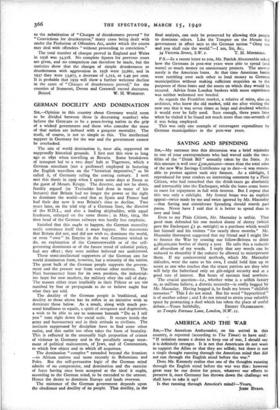GERMAN DOCILITY AND DOMINATION
SIR,—Opinion in this country about Germany would seem to be divided between those (a decreasing number) who believe the Germans to be a peace-loving nation in the grip of a wicked government and those who consider the mass of that nation are imbued with a gangster mentality. The truth, of course, is not so simple as this. The intellectual support in Germany for the war and the government cannot be overlooked.
The aim of world domination is, inter alia, supported on supposedly historical grounds. I first met this view as long ago as 1891 when travelling m Bavaria. Some breakdown of transport led to a two days' halt at Tegernsee, which a German merchant (not a professor) employed in lecturing the English travellers on the " historical imperative," as he called it, of Germany ruling the coming century. I next met this thesis in 1909 when I spent some days at Essen as the guest of Messrs. Krupp. The director, and not he alone, frankly argued (as Treitschke had done in many of his lectures) that Britain had no longer the power or the right to dominate the world—and that as Spain and France had had their day now it was Britain's time to decline. Two years later, on the trial trip of a German liner, the director of the N.D.L., and also a leading shipbuilder, with equal frankness, enlarged on the same theme ; in May, 1914, the then head of the German railways was hardly less emphatic.
Satisfied that this ought to happen, the German mentality easily convinces itself that it must happen. No statements that Britain did not, and did not wish to, dominate the world, or even " own " its Empire in the way Germany wished to do, no explanation of the Commonwealth or of the self- governing dominions or of the future trend of colonial policy, had any effect ; they were neither believed nor understood.
These semi-intellectual supporters of the German aim for world domination form, however, but a minority of the nation. The great bulk of the German people supports the govern- ment and the present war from various other motives. The Nazi bureaucracy fears for its own position, the industrial- ists hope for new markets, the military obey the call of duty. The masses either trust implicitly in their Fiihrer or are too numbed by fear or propaganda to do or believe aught but what they are told.
The docility of the German people is 'traditional, and docility to those above has its reflex in an imitative wish to dominate those below. As a result, along with much per- sonal kindliness to equals, a spirit of arrogance and dogmatism, a wish to be able to say to someone beneath " Do as I tell you " runs right down the social scale. It occurs inside the army and bureaucracy and in their attitude to civilians. The instincts suppressed by discipline have to find some other outlet, and this outlet too often takes the form of brutality. This is reflected in the unusually high proportion of crimes of violence in Germany and in the peculiarly savage treat- ment of political malcontents, of Jews, and of Communists, to which few object and in which all acquiesce.
The domination " complex " extended beyond the frontiers —to African natives and more recently to Bohemians and Poles. But the self-persuasive logic of the German mind admits of no compromise, and domination and the exercise of force having once been accepted as the ideal it ought, according to the German mind, to be extended to the utmost. Hence the desire to dominate Europe and lands overseas.
The existence of the German government depends upon the obedience and docility of its people. That docility, in the final analysis, can only be preserved by allowing this people to dominate others. Like the Tempter on the Mount the government in effect says to the German nation " Obey me and you shall rule the world."—I am, Sir, &c., P.S.—In a recent letter to you, Mr. Patrick Abercombie asked how the Germans in post-war years were able to spend (and waste) so much money on unnecessary projects. The answer surely is the American loans. At that time American banks were tumbling over each other to lend money to German municipalities without making sufficient enquiries as to the purposes of these loans and the assets on which they would be secured. Advice from London bankers with more experience was neither welcomed nor heeded.
As regards the Frankfort market, a relative of mine, also an architect, who knew the old market, told me after visiting the new one that it was seven times as large and doubted whether it would ever be fully used. Sure enough, three years later when he visited it he found not much more than one-seventh of it was being employed.
This was only one example of extravagant expenditure by German municipalities in the post-war years.






















































 Previous page
Previous page